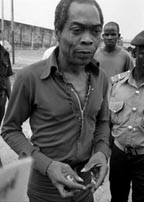|
August 21, 2000 Features What's
in Your Green Tea? Why
I'm Voting for Nader ... ...
And Why I'm Not Fox
Shocks the World Tijuana
Troubles Unions
Get Religion News Safety
Last Sale
of the Century Water
Wars Profile Editorial Viewpoint Appall-O-Meter Give
It Away Good
Fela Time's
Arrow Mission:
Impossible 3 |
Good Fela
By Hillary Frey
| Fela:
The Life and Times of a Musical Icon. By Michael Veal Temple University Press 313 pages, $24.95 |
Last year Nigeria held its first successful civilian election since 1979, ending 17 years of military rule. Party leaders rallied spiritedly - if not always peacefully - behind their candidates; civilians ventured out to cast hand-marked ballots. Retired general Olusegun Obasanjo won the contest with 68 percent of the vote, promising an honest, development-oriented government. At the turn of the century, many have a restored hope for this largest of West African nations.
But should they? It's an under-reported fact in the Western press that this is Obasanjo's second time in office - in the '70s he spent four years as a military dictator. And although Obasanjo gave way willingly to a civilian government in 1979, the years of his rule were neither peaceful nor prosperous; instead they were all too typical of Nigeria's pervasively corrupt and repressive government. Abuses of power are already suspected in his new administration; international election monitors reported tainted poll results for the presidential race. And just last May, in an effort to destigmatize the unpopular Nigerian military, Obasanjo appointed former military chiefs to university chancellorships, raising the question of just how separate the government and military will be under this new leadership.
 |
| Fela in 1993; he died from AIDS four years later. Credit: AFP/Ade Obisean. |
If Fela Anikulapo-Kuti, Nigeria's most popular music star, were alive today, he would have much to criticize in present-day Nigeria. A charismatic nationalist, a vehement dissident, a fearless, controversial, talented performer, he would have words for Obasanjo that, even under a democratic government, might get him in trouble. Through his signature brand of "afrobeat" - a politicized, African-American influenced, funked-up version of traditional Nigerian music - Fela provided a continuous, dangerous and often illegal critique of Nigeria's leaders from the early '70s until his death in 1997 from AIDS complications.
Yale ethnomusicologist Michael Veal, who played as a guest saxophonist with Fela and his Egypt 80 band, has written a book, Fela: The Life and Times of a Musical Icon, that both remembers Fela and illuminates his lasting relevance. Take Fela's 1981 song "International Thief Thief," transcribed in Veal's exhaustive biography. Dedicated to Obasanjo and Decca Records chairman M.K.O. Abiola - a wealthy, powerful philanthropist who Fela despised as a darling of Western imperialism - "I.T.T." (a play on International Telegraph and Telephone, for which Abiola worked) describes both men as "thieves," "rats running over and under," and "men of low mentality."
But Veal's book is more than a catalog of Fela's lyrics. Following his life and musical development chronologically, Veal places Fela within the tumultuous and fascinating context of Nigeria's contemporary political culture, as well as the broad West African musical tradition. Fela supplies a crash course in Nigeria's chaotic and brutal post-colonial experience as much as it paints a portrait of the icon.
![]()
Hillary Frey is managing editor of Lingua Franca.
|
In These Times ©
2000
Vol. 24, No. 19 |
